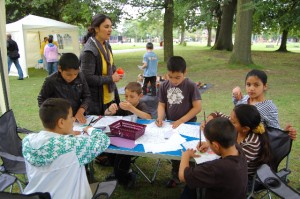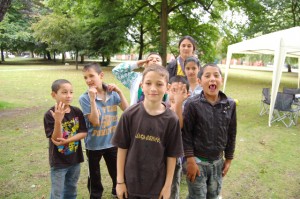An authoritative analysis in today’s Society Guardian of the deepest spending cuts in a generation, which start from Friday. The special issue inludes some sector by sector breakdowns of savings and job losses, including pieces I contributed to the in-depth coverage.
Category Archives: Social exclusion
The cuts – an alternative
For those who’ve not already seen it, this powerful film presents an alternative to the government’s devastating cuts agenda. It features community groups and anti-cuts campaigners along with Bill Nighy, Radiohead’s Ed O’Brien and Zac Goldsmith MP. Worth watching ahead of this weekend’s demo in London against the cuts.
It Cuts Both Ways…The Alternatives from Oonagh Cousins on Vimeo.
Digital switchover boss pledges help to the hardest to reach
Peter White must be the only chartered accountant in the country with a corporate slogan that could belong to a social exclusion charity – “Nobody left behind” – a clutch of charity partnerships under his belt and a network of neighbourhood activists whose grassroots knowledge helps him do his job. Read my Society Guardian interview here with Peter White, the head of the BBC’s digital switchover scheme who is trying to ensure nobody is left with a blank TV screen.
Young people putting the record straight
With age, so it’s said, comes wisdom. While I’m not sure this is always true, I do know that with age also comes a creeping inability to know what it’s really like to be a young person today. This is particularly maddening, most under-24s will tell you, when they hear themselves and their issues being aired in the public arena by politicians, policymakers and commentators twice their age.
Working on a special youth edition of Society Guardian, the overriding feeling shared by the young writers involved was one of frustration at the stereotypical view of young people (and if this sounds like a plaintive teenage whine of “no one understands us”, it wasn’t; their complaints about misrepresentation were more valid than that).
So it’s not surprising that in three years of campaigning and going to conferences, seminars and workshops on youth crime, activist Eliza Reberio, 17, says she feels “the research findings and the observations made did not always convey the reality… nothing that was being done or said was making the changes that were required”.
Which is why Reberio and her young peers at the London-based anti-violence campaign Lives Not Knives are planning a youth-led conference, aptly titled Putting the Record Straight, which they want to hold at the end of March.

Reberio explains: “We think it is time that the young people of London had their chance to speak and in fact put the record straight to significant policy makers and make sure not only that their voices are heard, but the right changes are made.” LNK sends peer mentors into schools to share experiences of gang culture and reduce its appeal.
Eliza Reberio explains the aims behind her Lives Not Knives campaign
The government recently announced £18m for tackling knife crime and gun and gang culture following a report into the issue by former EastEnders actor Brooke Kinsella. Kinsella, whose 16-year-old brother, Ben, was stabbed to death in 2008, was appointed as a government adviser on knife crime last year.
Compared to the high-profile Kinsella launch – welcome as it is – Reberio’s has a more grassroots feel to it. She launched LNK in 2007 at the age of 14 because, as she explains, “the toll of teenagers being stabbed due to youth crime and gang culture made an impact on me and others around me.” Expelled from her school for disruptive behaviour, Reberio realised that she was accepting knife crime as nothing out of the ordinary: “I heard about friends being stabbed and I thought it was normal..I would get texts saying someone had been stabbed the night before and I wasn’t shocked. Then I looked at my friends’ little brothers and sisters waking up to those texts and I wanted to change things.”
Printing and selling t-shirts emblazoned with the words “lives not knives” to family and friends, Reberio used the proceeds of the sale to hold a DJ night in her hometown of Croydon, south London, “for youth to have fun without violence” attended by 150 young people.
The campaign mushroomed and corporate donations lead to a booklet written and drawn by young people, depicting their experiences of knife violence and gang culture – thousands of copies were distributed to Croydon schools. LNK now has a 20-strong team of mentors including those who have either lost a friend, been a victim or perpetrator of violent crime or are ex-gang members. Reberio has just won a Diana Award for her work and the project is part-funded by Croydon council, which has made her a local ambassador.
Last year, the young campaigner was picked to feature in the Channel 4 project, Battlefront, which follows a group of 14-21-year-olds as they turn their issues into campaigns.
Now, Reberio’s plan with the youth conference is to work with other community youth led organisations and show organisations such as the police, youth justice staff, politicians, policy makers, adults, parents and teachers “how life really is for young people on the streets of London, how youth violence is affecting our lives and the real changes that need to be made to make London a safer place for young people”.
The young campaigers are now looking for a central London venue and help with everything from organising the event to identifying contacts – young people as well as youth-related organisations – who might benefit from the event.
Anyone who can help or advise should email Reberio livesnotknives@hotmail.com or leave a message on this page.
Small steps towards a big society approach to learning
There is something of a gaping reality chasm between the vision of the big society and its fruition, not to mention growing accusations that the concept is a smokescreen for cuts. The chasm between vision and fruition might be narrowed by better and stronger mechanisms for civic service – or simply more hours in the day, as big society tsar Nat Wei recently demonstrated.
However, one scheme that has slowly and steadily supported and facilitated volunteers to promote an activity – in this case, adult learning – is the Community Learning Champions project. The drive, a joint partnership between NIACE (the National Institute of Adult Continuing Education), WEA, lifelong learning organsiation unionlearn and education consultants Martin Yarnit Associates, involves people who become active in their community by promoting the value of learning to others.
Launched in August 2009 , the three-year £3m Department of Business, Innovation and Skills (BIS) funded scheme ends in March (but of course!) but its ripple effect has been felt at a community level by hundreds of people. More than 1,000 champions should be registered by the end of next month and, if NIACE estimates are right and each champion encourages an average 30 people into learning, 30,000 individuals should be helped into learning as a result.
Champions promote learning among their friends, neighbours, relatives, or workmates; they are trusted as they speak from experience and act as role models to encourage others to take up new skills.
Homeless charity St Mungo’s – which of course has huge concerns about funding cuts – used the Community Learning Champions scheme last year to recruit up to 30 homeless volunteers to become learning champions.
The volunteers, recruited through the charity’s client representative group Outside In which managed the project, encouraged others get involved in learning, anything from gym classes to art workshops.
In the film here, St Mungo’s service user Richard talks about his love of soaking up new knowledge and the difference you can make thanks to a non-classroom learning environment. As he says: “All the time I was homeless, on drugs, this is the sort of thing I always had in my head that when I eventually sorted my life out, it’s the sort of thing I wanted to be doing.”
Learning disability: real freedom means freedom of movement
Real freedom, as Mary Pearson, mother to a learning disabled young person, says in the short film below, requires freedom of movement.
The film, by David Herman of the learning disability charity Camphill communities , is part of the ongoing campaign to help disabled people in care who want to live more independently but who are being prevented from doing so by funding wrangles between local authorities.
The cuts agenda combined with local government red tape means forcing vulnerable people (and their families and carers) through hoops if they want to move from one council area to another – and there’s no guarantee of success if you attempt this. But learning disablity campaigners are calling for funding to follow individuals. A sort of portable personalised budget and assessment system is what’s needed.
The film is part of the charity’s submission to the government-appointed Commission on the Funding of Care and Support which is due to report back in July. The scenes here offer a snapshot of the sort of rich community life that my sister is thriving in at The Lantern Camphill community.
Why everyone should support One Month Before Heartbreak
I’m supporting the two-day online campaign, One Month Before Heartbreak, that took place this weekend against planned reforms to Disability Living Allowance (DLA), the disability benefit that allows tens of thousands of disabled people to get out and about from residential homes. The DLA consultation period ends on February 14th, Valentine’s Day.
In the words of blogger Brianb: “Many of us, concerned at the way the coalition government is bullying, victimising, stereotyping, abandoning and, stigmatising those of us who live with disability, have decided to publish blogs almost simultaneously to draw attention to these injustices being perpetrated”.
Given the warm glow the government wants to create with its big society approach, the cut seems even more unfair, and shortsighted, and as The Guardian’s David Brindle has highlighted, the cut is not only “the meanest and nastiest cut of all in the carnage that is sweeping through our public services” but is based on flawed reasoning.
Although individual campaigning organisations within the disability sector might have a history of being vocal, as a whole, individuals with disabilities and their carers aren’t much known for taking off their gloves and sticking their heads above the parapet. Until now. A huge, vibrant and persuasive online community of writers and campaigners is fighting injustice through blogging and on twitter.
As blogger Ned Ludd Carer points out, the cuts are “about locking up disabled people in their own homes and taking away the desperately needed care…This doesn’t have to happen. We need to stop these cuts before they do any more damage. We carers need to get our heads out of the sand and start shouting. We need to stop being the silent, heroic martyrs the press and TV love to wheel out for a nice heartwarming end to the programme. We need to be Carers With Attitude.” The gloves are off.
Arbitrary Constant has highlighted the main concerns for the disabled while you can also read Community Care’s blog for a litany of cuts that hit the vulnerable.
Anyone in two minds about supporting the campaign – and there are already 2,500 names on the online petition to recall the consultation – should read blogger Bendy Girl who argues that the cuts should be everybody’s business, not just an issue for the disabled and their carers.
As the One Month Before Heartbreak campaign stresses, 100 years ago “disabled people were institutionalised and kept out of the public eye so that the public would need not feel embarrassed to look upon a disabled person.” The removal of DLA will trap the disabled in their care homes. And that’s something best consigned to the history books.
A neet partnership

Aiming to crack two of the public sector’s greatest challenges – homelessness and the Neet issue – is daunting enough. Doing so with a multi-agency partnership spanning the sectors of local government, charity, education and housing makes the task even more ambitious. Read more about the scheme in Banbury in my Guardian Public article today.
Are we losing the care in our communities?

People found themselves discharged from hospitals into small group homes in virtually every town in the UK. These were shared houses registered as care homes operating effectively as shared supported housing in the days before the supported living drive but without the important security of a tenancy. For many it felt like not only a new life, but a better one.
But now, just as people are looking forward to enjoying this life, due to bureaucratic, regulatory and financial reasons, people are trapped in unwanted small registered care homes. These homes are now closing because of running costs or the need to meet national minimum standards and changes in commissioning practice which prefer supported housing over ‘care homes’.
The problem is these closures are not happening in a strategic or orderly way, so the people living there face the prospect of another move into the unknown.
Take John, for example. He has a complex disability and moved from a long stay institution in 1986 to live in the community. His funding came from the council (let’s call it council A) where his parents lived although his new home was based in a different local authority area (council B).
In 1990 John moved to a smaller house, still registered as a care home (as it was before the supported living options became available), but less rural and with more to do in the community. The new house was still based in council B’s area and the funding arrangements continued.
Over the last 15 years John and his housemates have enjoyed a settled and fairly contented life building up their local support networks. Recently, two of the other people living there have moved on, leaving behind John and a fellow housemate, Mary (she is funded by council C).
The problem is that the charity that runs the home cannot find new people to move in to fill the vacancies – it has continued to run the service at a loss for the past two years.
The inability to find people to join John and Mary has been largely due to the understandable reluctance of authorities to make referrals to registered care placements.
As a solution, the charity could de-register the accommodation so it is no longer classed as a care home, but if it does so, it will come up against two bureaucratic barriers. Firstly, local government ‘ordinary residence’ rules mean council B would have to take on the support costs for John and Mary (while councils A and C would relinquish all funding). Secondly, council B is reluctant to open up its procurement arrangements to recognise the charity as a preferred contractor so will not place people there under contract for supported living!
Unknown to John and Mary, the home is likely to close and they will be faced with a move back to authorities A and C, a part of the country they haven’t lived in for over 20 years where not many family members remain. The costs to authorities A and C are very likely to increase while authority B will lose a good resource that could meet local needs.
The Voluntary Organisations Disability Group (VODG) researched the issues affecting people with disabilities because of the Ordinary Residence rules in 1997.
Our 2007 report titled No Place Like Home recommended three actions: firstly to agree the principle of a person-centred approach to funding and placement, secondly for the government to issue guidance and thirdly to put in place a framework for funding to transfer between authorities.
In October the VODG published Not in My Backyard as a follow up and found that despite the fact that new guidance had been issued there was little evidence of good practice. VODG demands the government include the concept of portability of social care entitlement in the white paper on social care due to be published next year.
We must do right by people like John and Mary; they represent a particularly wronged generation of people. Regardless of promises for future reform we need a kind of national amnesty, one that ensures funding is in the right place, providers and commissioners are working in partnership and individuals are given a proper voice. Because putting people first is not just a one off action, it is an enduring commitment.
How Roma integration could be child’s play
It is a simple act that speaks volumes about the barriers that have been broken; a young Roma boy hands a flower to the play worker he had been so challenging towards just two weeks ago.
The scene took place in August at a groundbreaking playscheme run by social enterprise the Big Life group which encouraged Roma children aged 7-11 to mix with their local Manchester counterparts.
As Europe’s largest ethnic minority, the 12m-strong Roma population might be dispersed across the EU, but it is unified in the discrimination routinely faced by its people. From being moved on from traveller sites to outright repatriation, Roma families live in poverty and are reluctant to contact statuary services fear being moved on or suffer harassment.
Negative perceptions of the Roma community in Manchester along with an increase in the number of Roma people wanting to sell The Big Issue in the North led to the launch of the Big Life group summer play scheme (Big Life owns the Big Issue in the North). Open to all children living in the Longsight area of Manchester, it aimed to break down barriers between the communities and reduce the perceived or actual nuisance behaviour over the summer.
The scheme was publicised through leaflets given out during the social enterprise’s family support sessions and through local children’s centres. Word of mouth also encouraged Roma children to access the project.

The scheme, jointly funded by Manchester city council and The Big Issue in the North Trust, did not charge participants and 60 children registered across the month-long scheme with a total of 30 per session. Take up was even; 52 % Roma registrations and 48% from other communities.
Project leader Daniel Achim recalls that the scheme got off to a shaky start: “At the beginning all children seemed to be rather slow to action the requests of the play workers. The children were testing the boundaries and the workers had to repeat the same information over and over again in order to get a result.”
Yet, as Achim says, by the end of the playscheme there was a major transformation in the behaviour of the children in terms of respect and politeness to staff. “In a safe and welcoming environment where they were not discriminated against children learned to relax around each other, they learned to share play equipment, they learned to wait their turn.”

While entrenched attitudes towards those who are different can be hard to shatter, the Big Life playscheme shows how to break down barriers through play. Any mutual suspicion was soon overcome. Encouraging integration through play and from an early age is starting to reap rewards.
As Achim says, often the tensions tended to be between children from the same backgrounds: “Sometimes it is easy to see differences between communities – when really it is just kids being kids.”
